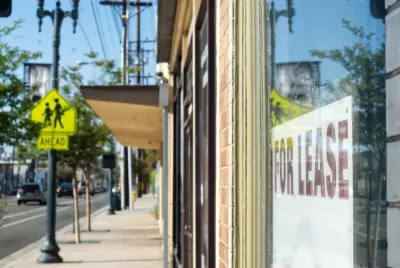The law, modeled on residential tenants’ rights, acknowledges the uneven power dynamics between many small business owners and their commercial landlords.

A new California law adds new protections for small commercial tenants, including fair notice of rent increase or termination of tenancy requirements, reports Oscar Perry Abello in Next City.
The law is meant to even the playing field for small business owners and nonprofits and limit the reach of institutional investors unfamiliar with the local community. “Businesses covered under the new law have the right to a lease written in the language that was used for negotiation with the landlord, security deposits limited to one month’s rent, and a right for documentation from landlords that explains how building maintenance fees are calculated, including any new increases in fees.”
Abello points out that speculative development by large investors has followed the expansion of the Los Angeles Metro rail system, which is finally building stations in some of the city’s historically underserved neighborhoods. Elsewhere in California, the rise of the tech industry in the San Francisco Bay Area fueled similar speculation, displacement, and gentrification.
According to Abello, “Pushing for these new commercial tenant rights is part of a multi-pronged strategy to counteract the real estate speculation displacing small businesses.” Cities like Los Angeles are also launching programs aimed at supporting legacy businesses and preventing their displacement, while activist organizations are banding together to help business owner groups purchase properties through community land trusts and other mechanisms.
FULL STORY: California’s New Commercial Tenant Rights Could Change the Game

Planetizen Federal Action Tracker
A weekly monitor of how Trump’s orders and actions are impacting planners and planning in America.

San Francisco's School District Spent $105M To Build Affordable Housing for Teachers — And That's Just the Beginning
SFUSD joins a growing list of school districts using their land holdings to address housing affordability challenges faced by their own employees.

The Tiny, Adorable $7,000 Car Turning Japan Onto EVs
The single seat Mibot charges from a regular plug as quickly as an iPad, and is about half the price of an average EV.

Seattle's Plan for Adopting Driverless Cars
Equity, safety, accessibility and affordability are front of mind as the city prepares for robotaxis and other autonomous vehicles.

As Trump Phases Out FEMA, Is It Time to Flee the Floodplains?
With less federal funding available for disaster relief efforts, the need to relocate at-risk communities is more urgent than ever.

With Protected Lanes, 460% More People Commute by Bike
For those needing more ammo, more data proving what we already knew is here.
Urban Design for Planners 1: Software Tools
This six-course series explores essential urban design concepts using open source software and equips planners with the tools they need to participate fully in the urban design process.
Planning for Universal Design
Learn the tools for implementing Universal Design in planning regulations.
Smith Gee Studio
City of Charlotte
City of Camden Redevelopment Agency
City of Astoria
Transportation Research & Education Center (TREC) at Portland State University
US High Speed Rail Association
City of Camden Redevelopment Agency
Municipality of Princeton (NJ)





























